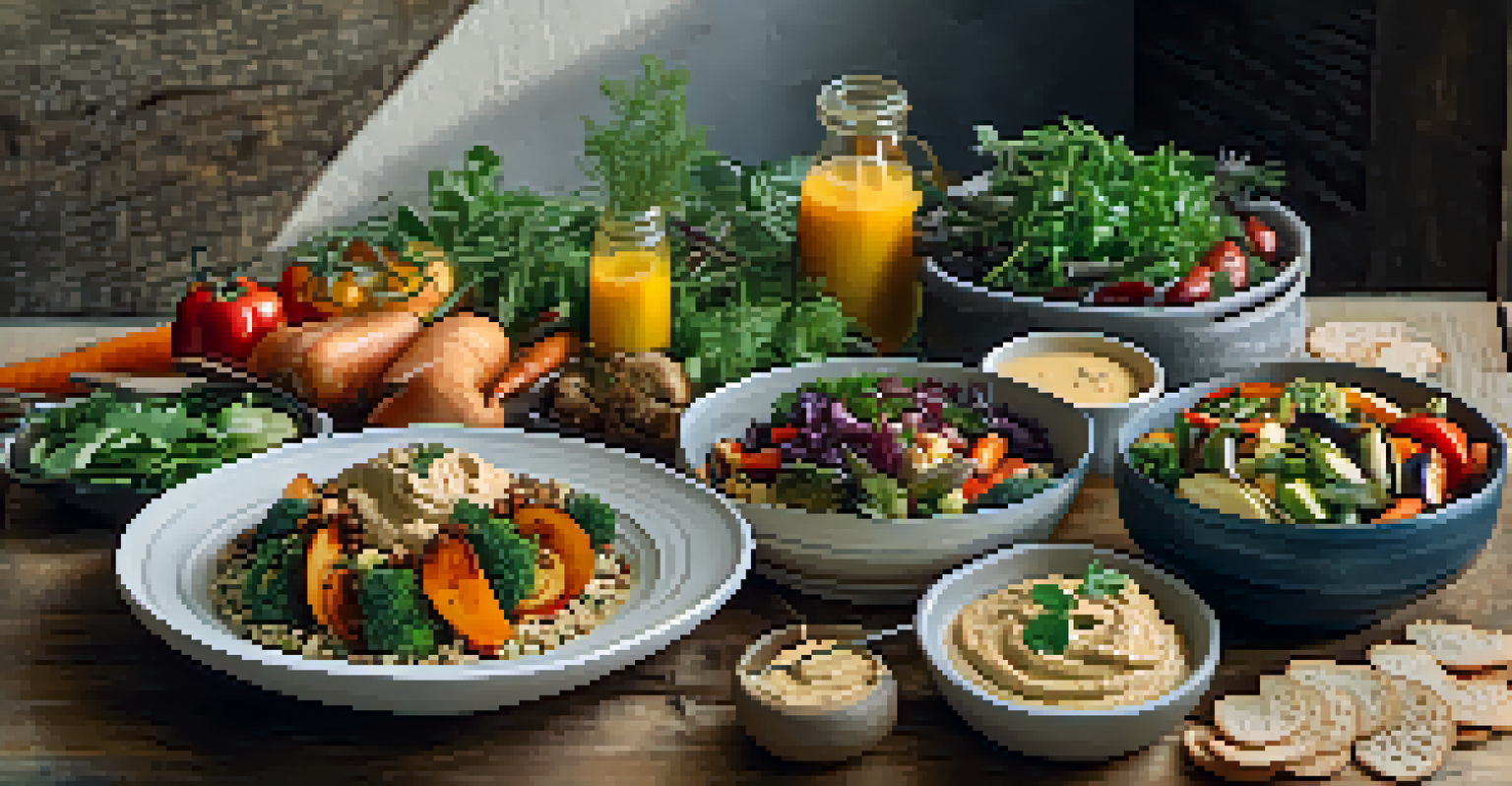Meal Planning Tips for Allergies in Vegetarian Diets

Understand Common Allergens in Vegetarian Foods
When planning meals for a vegetarian diet, it’s crucial to know common allergens. Ingredients like nuts, soy, and wheat are staples in many vegetarian recipes but can be problematic for some. Identifying these allergens allows you to make informed choices, ensuring meals are both safe and nutritious.
The food you eat can be either the safest and most powerful form of medicine or the slowest form of poison.
For instance, if someone is allergic to peanuts, opting for almond butter instead may seem like a good idea, but almonds can also trigger allergies. Always read labels carefully and consider alternative ingredients that fit your dietary needs. It's about striking a balance between nutrition and safety.
Additionally, keep a list of safe foods and allergens to avoid. This way, meal planning becomes simpler, and you won't accidentally include something that could cause an allergic reaction.
Create a Comprehensive Meal Plan
A well-structured meal plan is your best friend when accommodating allergies. Start by mapping out a week's worth of meals that cater to both vegetarian and allergy-friendly needs. This not only saves time but also helps minimize the risk of cross-contamination in your kitchen.

As you create your meal plan, consider using a variety of ingredients to ensure balanced nutrition. Include plenty of fruits, vegetables, whole grains, and proteins like legumes or seeds. This diversity keeps meals interesting and flavorful while adhering to dietary restrictions.
Know Common Allergens in Meals
Identifying allergens such as nuts, soy, and wheat is essential for ensuring safe and nutritious vegetarian meals.
Don’t forget to include snacks! Having safe, pre-planned snacks on hand can prevent last-minute decisions that might lead to allergen exposure. Think of simple options like hummus with veggies or roasted chickpeas.
Substituting Ingredients for Allergy Safety
Ingredient substitutions are key in creating allergy-friendly vegetarian meals. For example, if a recipe calls for eggs, consider using flaxseed meal or applesauce as a binder instead. These alternatives not only help avoid allergens but can also enhance the nutritional profile of your dishes.
Let food be thy medicine and medicine be thy food.
Similarly, dairy-free options like almond or coconut milk can replace traditional dairy in recipes. Experimenting with these substitutions can lead to delicious discoveries while keeping everyone safe from allergens.
Remember, it’s about being creative! Sometimes the best meals come from trying something new. Don't hesitate to explore different cuisines that naturally cater to your dietary restrictions.
Label Reading and Awareness
Understanding food labels is essential for anyone with allergies, especially in vegetarian diets. Many packaged foods contain hidden allergens, so learning to read labels effectively can help you avoid unwanted surprises. Look out for terms that may indicate the presence of allergens or cross-contamination.
Familiarize yourself with common phrases like 'may contain traces of' or 'produced in a facility that processes nuts.' These notes are crucial for someone with severe allergies. It’s worth the extra time spent in the grocery aisle to ensure safety and peace of mind.
Plan Meals with Allergies in Mind
Creating a comprehensive meal plan helps minimize allergen exposure while maintaining a balanced diet.
Moreover, don’t hesitate to reach out to manufacturers for clarification if you're unsure about an ingredient. Many companies are happy to provide detailed information about their products.
Incorporate Seasonal and Local Ingredients
Cooking with seasonal and local ingredients can simplify meal planning while keeping it allergy-friendly. Seasonal produce tends to be fresher, more flavorful, and often less expensive. Plus, it helps you diversify your meals throughout the year.
Local farmers' markets are great places to discover fresh options while supporting your community. Engaging with local vendors can also provide insights into how their products are grown and processed, which is helpful for allergy considerations.
Using seasonal ingredients allows you to create vibrant and satisfying dishes that everyone can enjoy. Think about incorporating pumpkin in fall or fresh greens in spring to keep your meals exciting and nutritious.
Meal Prep Strategies for Busy Lifestyles
Meal prepping can be a lifesaver for those juggling busy schedules while managing allergies. Dedicate a few hours on the weekend to prepare meals and snacks for the week ahead. This not only saves time but also helps avoid the temptation of grabbing unhealthy, allergen-containing foods on busy days.
When meal prepping, consider batch cooking staples like grains, legumes, and roasted vegetables. These items can serve as the base for multiple meals throughout the week, allowing for quick assembly without compromising on safety or nutrition.
Utilize Ingredient Substitutions
Using alternatives like flaxseed meal or dairy-free options can enhance nutrition while keeping meals allergen-free.
Investing in good-quality storage containers can make meal prep even more efficient. Labeling containers with the contents and dates can help you stay organized and ensure nothing goes to waste.
Seek Support and Resources
Navigating a vegetarian diet with allergies can feel overwhelming at times, but you don’t have to do it alone. There are plenty of resources available, from online communities to local support groups. Connecting with others facing similar challenges can provide encouragement and valuable tips.
Consider following blogs or social media accounts that focus on vegetarian cooking and allergy-friendly recipes. These platforms often share innovative ideas and personal stories that can inspire your meal planning journey.

Additionally, consult with a registered dietitian who specializes in allergies and vegetarianism. They can offer personalized advice tailored to your specific needs, ensuring you get the nutrition you require while avoiding allergens.